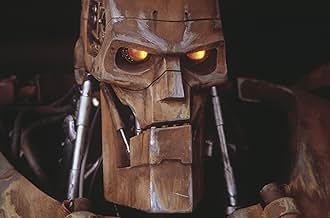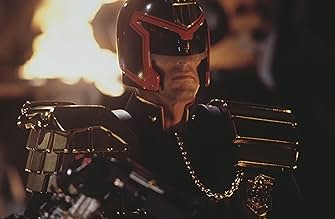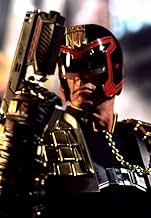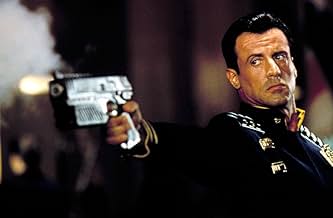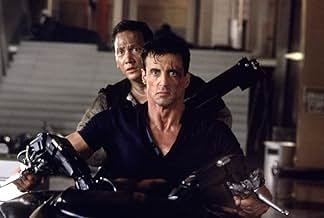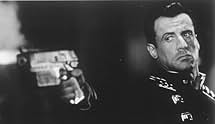अपनी भाषा में प्लॉट जोड़ेंIn a dystopian future, Joseph Dredd, the most famous Judge (a police officer with instant field judiciary powers), is convicted for a crime he did not commit and must face his murderous coun... सभी पढ़ेंIn a dystopian future, Joseph Dredd, the most famous Judge (a police officer with instant field judiciary powers), is convicted for a crime he did not commit and must face his murderous counterpart.In a dystopian future, Joseph Dredd, the most famous Judge (a police officer with instant field judiciary powers), is convicted for a crime he did not commit and must face his murderous counterpart.
- पुरस्कार
- 2 जीत और कुल 5 नामांकन
Jürgen Prochnow
- Judge Griffin
- (as Jurgen Prochnow)
Maurice Roëves
- Miller
- (as Maurice Roeves)
Christopher Adamson
- Mean Machine
- (as Chris Adamson)
कहानी
क्या आपको पता है
- ट्रिवियाIn later interviews, Sylvester Stallone said he felt the film was supposed to be a comedy/action film, and demanded re-writes to make it even more comedic. The director and screenwriter, however, had intended a darker, more satirical approach, which led to many difficulties behind the scenes.
- गूफ़When Dredd and Fergie are escaping from security after Rico and Griffin murder the high council, Dredd is wearing full Judge uniform. When he enters the room with the hoverbike, he is wearing the shirt. When he sits on the bike, he has lost the shirt and is wearing only a t-shirt. This happens in timespan of him sitting on the bike, he did not have time to remove it.
- भाव
Judge Dredd: I am the law!
- इसके अलावा अन्य वर्जनThe UK video version has been cut by almost 4 secs by the BBFC in three places. Two headbutts have been cut from the fight between Dredd and Mean Machine, as well as Stallone shooting an enemy right after he breaks free. A headbutt has also been cut from the fight between Hershey and Ilsa. The UK cinema version was uncut. A photograph in an SFX magazine article in 1995 showed Dredd shooting a Judge clone, but this scene isn't in the US or UK versions. This scene was also featured in the serialized comic strip adaptation of the film that was printed in Sunday Magazine in 1995.
- कनेक्शनEdited into The Frollo Show: Frollo Misses his Mother (2011)
- साउंडट्रैकThe Dredd Song
Performed by The Cure
Written by Robert Smith, Simon Gallup, Perry Bamonte, Jason Cooper and Roger O'Donnell
Produced by Robert Smith and Steve Lyon
Engineered by Steve Lyon
Fiction Songs/BMG Music-Fiction Songs U.K.
The Cure appears courtesy of Fiction Records; Elektra Records for the U.S. and Canada; East West for Australia and New Zealand; and Polygram for the rest of the world.
फीचर्ड रिव्यू
Judge Dredd is based on one of the most popular characters from the UK's 2000 AD comics. It is set in the 22nd Century, when most of the Earth has been turned into a desolate wasteland known as the "Cursed Earth" and most humans live in highly concentrated cities, walled off from the rest of the world. Society is fairly anarchic, except there for a class of humans, known as "judges", who act as cop, judge, jury and executioner all rolled into one. Sylvester Stallone is the titular judge. He's notorious among the other judges, the general citizenry and the other judges for upholding the law in a harsh way. The film primarily tells the story arc from the comics known as "The Return of Rico", and concerns a plot to get Dredd into trouble while overthrowing what's left of the existing "order".
This is a great action/sci-fi film with a tone reminiscent of Demolition Man (1993), Total Recall (1990), The Fifth Element (1997), Blade Runner (1982) and similar films. If you like Stallone, gloomy futuristic production design and/or intense action films, Judge Dredd should be a rewarding experience for you, as long as you're not a purist who is coming to the film by way of an intricate familiarity with the 2000 AD comics.
The source material caused a slight problem for me, too, but not because I'm a purist. Rather, Judge Dredd suffers a bit from a flaw that plagues many films based on comic books--writers Michael De Luca, William Wisher Jr. and Steven E. de Souza had an extensive, pre-existent mythology (as is necessary when creating a complete, new world) on which to build their work, and they tried to incorporate a bit too much of it. Because of this, we're introduced to a large cast of characters fulfilling functions that we're not familiar with (in the details, at least), and we're regularly faced with new lingo, new cultural concepts, new technology, and so on, often with just a couple lines of dialogue. If you want to understand the details, you really have to pay close attention. But on the other hand, the general arc of the story is relatively simple, and you don't have to know every detail to enjoy it.
Given the disposition that Stallone has as Judge Dredd in the film, he may as well have walked out of Kurt Wimmer's film Equilibrium (2002). Dredd initially goes about his business almost robotically; he only cares about enforcing the law. When he's recruited by a higher-up, Chief Justice Fargo (Max von Sydow), to teach ethics (which is quite an ironic idea when you see Dredd's behavior in the opening scene), he tells the students that being a judge basically means giving up one's life to the law. He says that one cannot have friends, for example--never mind that other judges, like Judge Hershey (Diane Lane) try to have social lives outside of work. Dredd later tells Hershey that he did have a friend at one point, but he had to judge him. Sending a friend to prison or killing him (we're not told exactly how Dredd judged him, although we find out later) isn't exactly the best way to encourage a healthy social life.
So the subtext of the story, and Dredd's character arc, becomes that through a number of hardships, he finally learns something about ethics for himself--just in time to deal with a potentially shattering bit of information about his personal identity. He ends up accompanied by a man, Herman Ferguson (Rob Schneider, in a role meant primarily as comic relief, although more generously, he's an ironic emotional facilitator), whom he had just judged harshly, even though Ferguson wasn't really doing anything wrong on his first day out of prison. Together they have to go to a figurative hell (The Cursed Earth) to deal with figurative "demons" (a famed band of rogue cannibals who live in the tough environment) and back again to reach their fulfillment.
Like many recent sci-fi stories set in the future, Judge Dredd has a pessimistic view of where technology and social conventions are leading humans. As the story has it, at one point, we had built massive, relatively unstoppable robot warriors, and one of the highlights of the film is when the villain finds one and puts it back into service. It's as much fun to watch the gadgetry as it is to watch the action sequences, and the computer generated "landscapes" throughout the film are spellbinding, with their sly jabs at various changes and similarities to present locations and cultures. The whole concept of the judges and their hierarchical structure is fascinating, even if some apparent inconsistencies (such as why judges are not summarily dealt with in the same manner that other citizens are) are never explained in the film.
The performances are good, even if a few actors barely get enough screen time (like Lane and Joan Chen, who plays semi-villain Ilsa), and the premise is captivating. It's too bad this film gets unduly knocked by purists and those misguidedly looking for detail realism in the genre. Judge Dredd is severely underrated on IMDb. It deserves a first look or a second chance.
This is a great action/sci-fi film with a tone reminiscent of Demolition Man (1993), Total Recall (1990), The Fifth Element (1997), Blade Runner (1982) and similar films. If you like Stallone, gloomy futuristic production design and/or intense action films, Judge Dredd should be a rewarding experience for you, as long as you're not a purist who is coming to the film by way of an intricate familiarity with the 2000 AD comics.
The source material caused a slight problem for me, too, but not because I'm a purist. Rather, Judge Dredd suffers a bit from a flaw that plagues many films based on comic books--writers Michael De Luca, William Wisher Jr. and Steven E. de Souza had an extensive, pre-existent mythology (as is necessary when creating a complete, new world) on which to build their work, and they tried to incorporate a bit too much of it. Because of this, we're introduced to a large cast of characters fulfilling functions that we're not familiar with (in the details, at least), and we're regularly faced with new lingo, new cultural concepts, new technology, and so on, often with just a couple lines of dialogue. If you want to understand the details, you really have to pay close attention. But on the other hand, the general arc of the story is relatively simple, and you don't have to know every detail to enjoy it.
Given the disposition that Stallone has as Judge Dredd in the film, he may as well have walked out of Kurt Wimmer's film Equilibrium (2002). Dredd initially goes about his business almost robotically; he only cares about enforcing the law. When he's recruited by a higher-up, Chief Justice Fargo (Max von Sydow), to teach ethics (which is quite an ironic idea when you see Dredd's behavior in the opening scene), he tells the students that being a judge basically means giving up one's life to the law. He says that one cannot have friends, for example--never mind that other judges, like Judge Hershey (Diane Lane) try to have social lives outside of work. Dredd later tells Hershey that he did have a friend at one point, but he had to judge him. Sending a friend to prison or killing him (we're not told exactly how Dredd judged him, although we find out later) isn't exactly the best way to encourage a healthy social life.
So the subtext of the story, and Dredd's character arc, becomes that through a number of hardships, he finally learns something about ethics for himself--just in time to deal with a potentially shattering bit of information about his personal identity. He ends up accompanied by a man, Herman Ferguson (Rob Schneider, in a role meant primarily as comic relief, although more generously, he's an ironic emotional facilitator), whom he had just judged harshly, even though Ferguson wasn't really doing anything wrong on his first day out of prison. Together they have to go to a figurative hell (The Cursed Earth) to deal with figurative "demons" (a famed band of rogue cannibals who live in the tough environment) and back again to reach their fulfillment.
Like many recent sci-fi stories set in the future, Judge Dredd has a pessimistic view of where technology and social conventions are leading humans. As the story has it, at one point, we had built massive, relatively unstoppable robot warriors, and one of the highlights of the film is when the villain finds one and puts it back into service. It's as much fun to watch the gadgetry as it is to watch the action sequences, and the computer generated "landscapes" throughout the film are spellbinding, with their sly jabs at various changes and similarities to present locations and cultures. The whole concept of the judges and their hierarchical structure is fascinating, even if some apparent inconsistencies (such as why judges are not summarily dealt with in the same manner that other citizens are) are never explained in the film.
The performances are good, even if a few actors barely get enough screen time (like Lane and Joan Chen, who plays semi-villain Ilsa), and the premise is captivating. It's too bad this film gets unduly knocked by purists and those misguidedly looking for detail realism in the genre. Judge Dredd is severely underrated on IMDb. It deserves a first look or a second chance.
- BrandtSponseller
- 24 अप्रैल 2005
- परमालिंक
टॉप पसंद
रेटिंग देने के लिए साइन-इन करें और वैयक्तिकृत सुझावों के लिए वॉचलिस्ट करें
Sylvester Stallone's Most Iconic Roles
Sylvester Stallone's Most Iconic Roles
We're celebrating the iconic Sylvester Stallone with a look back at some of his most indelible film performances, from Rocky and Rambo, to Joe in the new superhero movie Samaritan.
विवरण
- रिलीज़ की तारीख़
- कंट्री ऑफ़ ओरिजिन
- भाषा
- इस रूप में भी जाना जाता है
- Thẩm Phán Dredd
- फ़िल्माने की जगहें
- उत्पादन कंपनियां
- IMDbPro पर और कंपनी क्रेडिट देखें
बॉक्स ऑफ़िस
- बजट
- $9,00,00,000(अनुमानित)
- US और कनाडा में सकल
- $3,46,93,481
- US और कनाडा में पहले सप्ताह में कुल कमाई
- $1,22,91,536
- 2 जुल॰ 1995
- दुनिया भर में सकल
- $11,34,93,481
- चलने की अवधि1 घंटा 36 मिनट
- रंग
- ध्वनि मिश्रण
- पक्ष अनुपात
- 2.39 : 1
इस पेज में योगदान दें
किसी बदलाव का सुझाव दें या अनुपलब्ध कॉन्टेंट जोड़ें


